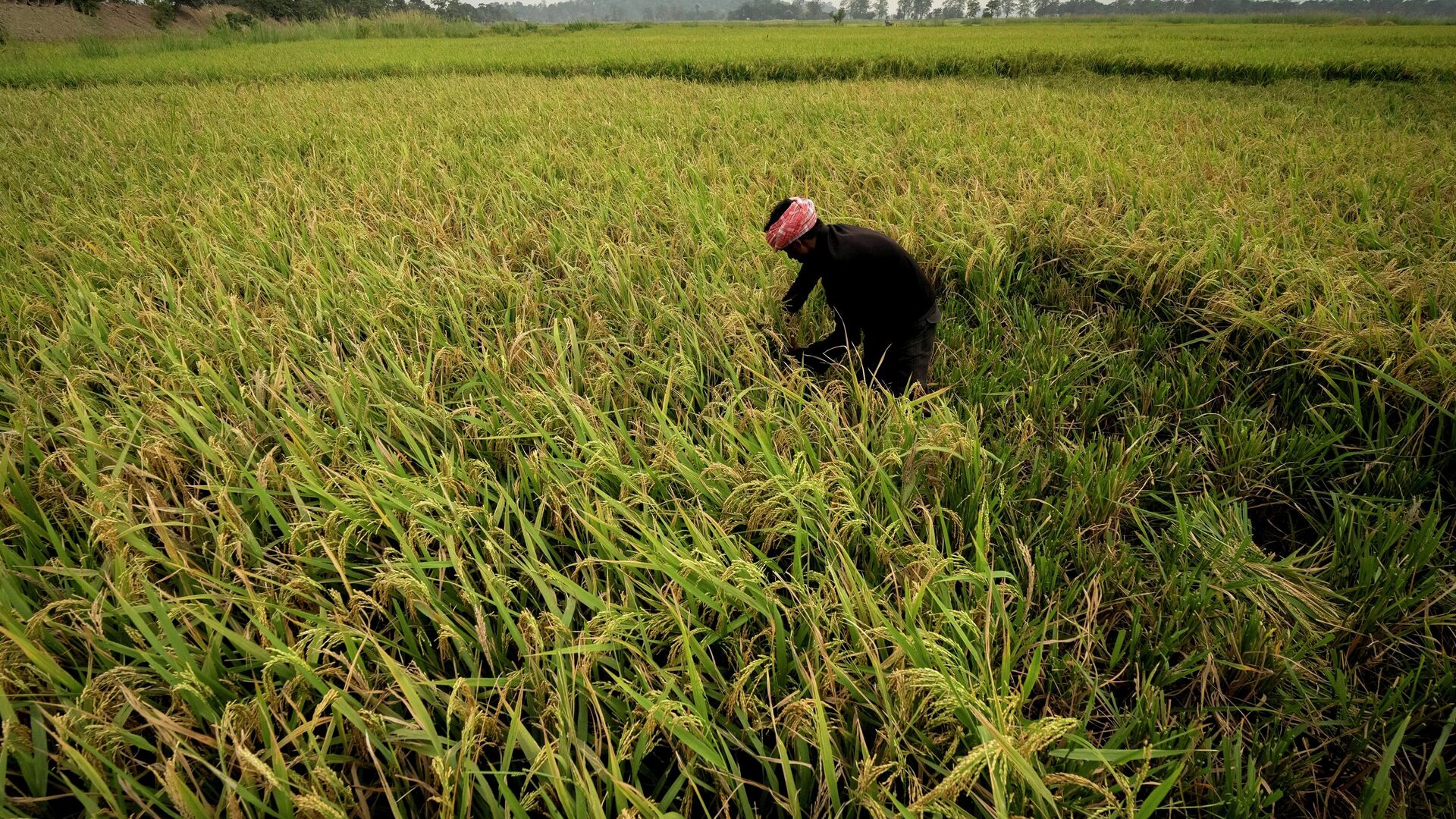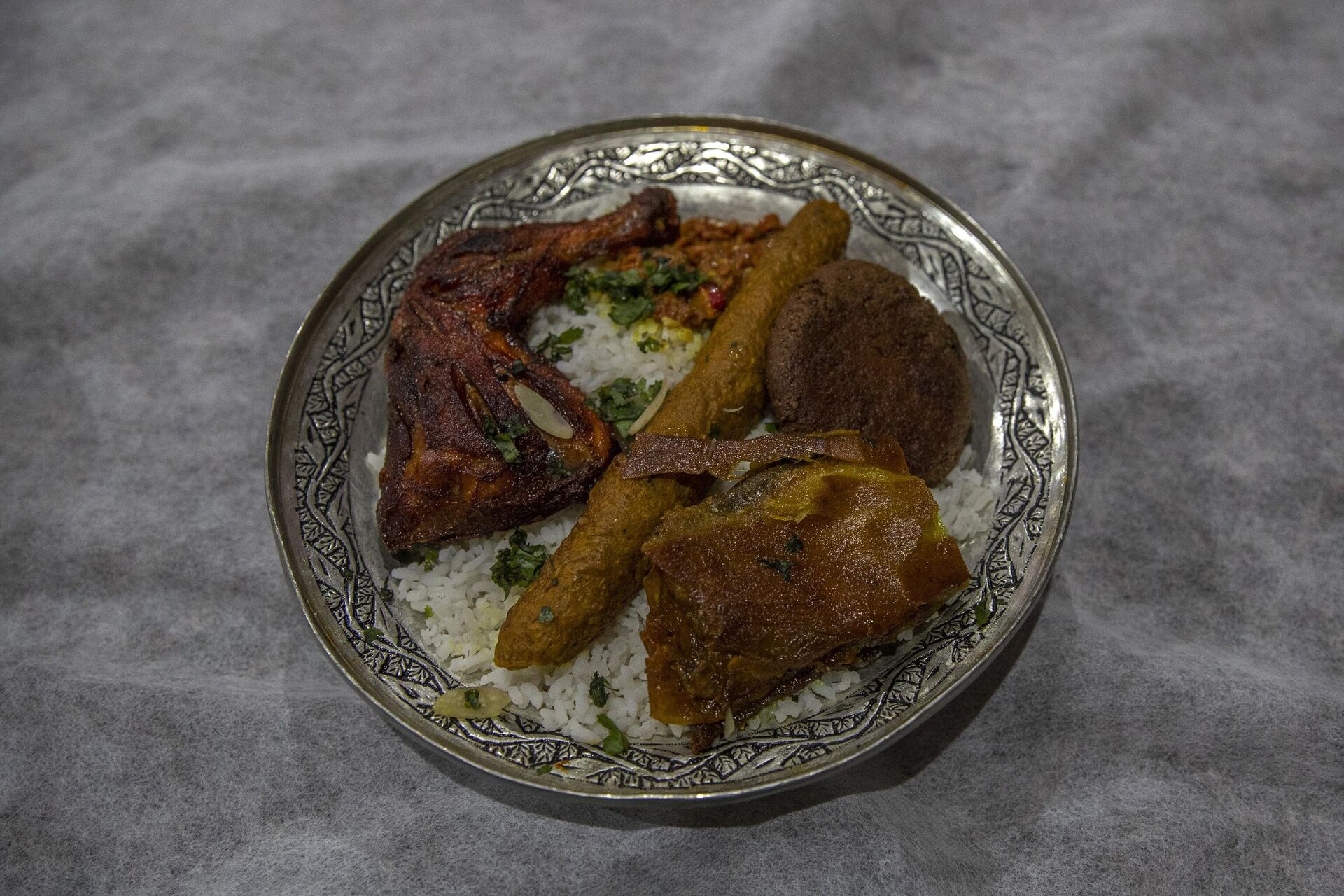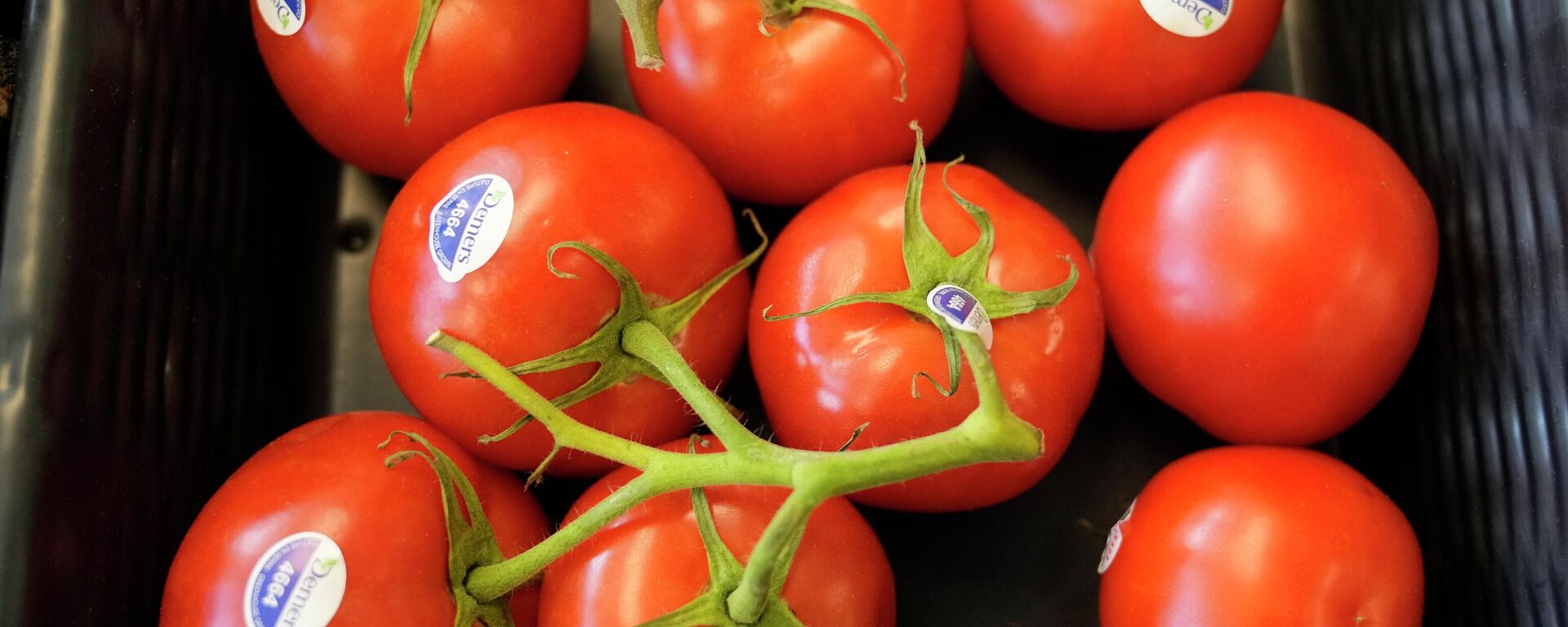https://sputniknews.in/20230819/indias-rice-export-ban-strengthens-homegrown-food-security-3671648.html
India's Rice Export Ban Strengthens Homegrown Food Security
India's Rice Export Ban Strengthens Homegrown Food Security
Sputnik India
India's decision to ban the export of non-basmati rice ensures that ordinary citizens are provided food in the most populous nation in the world, an expert told Sputnik India.
2023-08-19T08:04+0530
2023-08-19T08:04+0530
2023-08-19T08:04+0530
sputnik opinion
india
government of india
minimum support price (msp)
export embargo
wheat export
wheat export ban
imf loan
pakistan
africa
https://cdn1.img.sputniknews.in/img/07e7/08/12/3683712_0:160:3072:1888_1920x0_80_0_0_1f81d2965b45bda22c68110189702d54.jpg
As the price of rice continues to rise across the domestic market, India banned the export of non-basmati rice in July, which drew criticism from world platforms, including the International Monetary Fund (IMF).Global prices of wheat, rice and other staple food have accelerated since early 2022, when Western nations imposed sanctions on Russia. The costs of growing food items have risen because of a fertiliser price spike.Sputnik India spoke with Ravishankar Mantha, co-founder and CEO of Agrisk Data Analytics, appreciated the government's decision to ban the export of non-basmati rice and said that the Indian administration has made it clear that it puts its citizens first.Ensuring Availability of Food for All IndiansMantha said that the current government sees food items as consumable items, not tradable commodities.India's reason for banning rice includes inflation, fears of a shortage due to erratic weather patterns, and on top of that the country is now heading into a festive season and gearing up for elections.Is Global 'Rice' Lobby Worried About India's Export Ban?Mantha said that India's decision to prohibit exports of the staple food has shocked the rice trading lobby. He pointed out these lobbies are so strong and influential that they have the power to change the ruling government in countries.“These trading firms have ripped the entire world ecosystem to their benefit,” Mantha says.“The government has already said that they are open for government-to-government (G2G) sales. In fact, G2G talks with Nepal and Bhutan are already placed on. We’ve enough stock available to fulfil global demand,” he added. Is Food the New Oil of 21st Century?After India's restrictions, experts said, it could trigger a Domino effect as other countries, including Thailand, Vietnam, and Pakistan, which account for 30 percent of global rice sales, may place curbs on exports.Domestically, there is no shortage, and we will have an outstanding stock, and the current crop is growing very well, the CEO of the agro-business disclosed.However, Mantha warned that it's essential for the government to maintain the price line, which is really critical. We are already seeing some amount of chaos in the case of wheat and tomatoes in the country. Also, being an election year, there is always the possibility of trying to nudge and push up the price, which could become a potential talking point. The government has to have to be very careful and watchful, he stated.Does Delhi's Rice Ban Affect India’s Global Image?Mantha contended that if anything is happening with India’s image, it is becoming more assertive, adding that nobody is bothered when West says India’s image is tarnished.Seeing What's AheadMost experts said India expects 135 million tonnes of rice, but in August and September, the actual number will be around October for rice. This monsoon, or “kharif” crop in India, makes up about 80 percent of the total rice production.India has a stockpile of 41 million tonnes of rice, enough to feed its citizens. It also has a strategic reserve to provide 700 million poor people under its Public Distribution System (PDS) at a lower cost.Meanwhile, the federal government last week announced it would auction 2.5 million tonnes of rice to the Food Corporation of India (FCI) on the open market to control the domestic price.
https://sputniknews.in/20230810/india-set-to-import-tomatoes-as-prices-jump-by-1400-percent-3528435.html
india
pakistan
africa
south africa
north africa
thailand
vietnam
nepal
bhutan
Sputnik India
feedback.hindi@sputniknews.com
+74956456601
MIA „Rossiya Segodnya“
2023
Deexa Khanduri
https://cdn1.img.sputniknews.in/img/07e6/0c/13/138923_52:0:533:481_100x100_80_0_0_cadf23d341691fc65ff2b22fd1afe584.jpg
Deexa Khanduri
https://cdn1.img.sputniknews.in/img/07e6/0c/13/138923_52:0:533:481_100x100_80_0_0_cadf23d341691fc65ff2b22fd1afe584.jpg
News
en_IN
Sputnik India
feedback.hindi@sputniknews.com
+74956456601
MIA „Rossiya Segodnya“
Sputnik India
feedback.hindi@sputniknews.com
+74956456601
MIA „Rossiya Segodnya“
Deexa Khanduri
https://cdn1.img.sputniknews.in/img/07e6/0c/13/138923_52:0:533:481_100x100_80_0_0_cadf23d341691fc65ff2b22fd1afe584.jpg
rice export ban, india rice export ban, non basmati rice export ban, india rice exports ban, broken rice export ban, basmati rice export ban india, rice export ban in india, rice ban, rice exports ban, rice export ban news, rice price in india, basmanti rice price in india, global rice cost on boil, rice shoratge in developing nations, global food security, ravi shankar mantha, cost of fertilizers, rice cultivation in india, rice crop production in india, basmanti rice production, why is rice export banned, is india going to ban rice export, is 100% broken rice export ban in india, why india stopped exporting rice, why indian rice is not exported, which country need rice from india, is india rich in rice, who is the biggest importer of indian rice,
rice export ban, india rice export ban, non basmati rice export ban, india rice exports ban, broken rice export ban, basmati rice export ban india, rice export ban in india, rice ban, rice exports ban, rice export ban news, rice price in india, basmanti rice price in india, global rice cost on boil, rice shoratge in developing nations, global food security, ravi shankar mantha, cost of fertilizers, rice cultivation in india, rice crop production in india, basmanti rice production, why is rice export banned, is india going to ban rice export, is 100% broken rice export ban in india, why india stopped exporting rice, why indian rice is not exported, which country need rice from india, is india rich in rice, who is the biggest importer of indian rice,
India's Rice Export Ban Strengthens Homegrown Food Security
Deexa Khanduri
Sputnik correspondent
India's decision to ban the export of non-basmati rice ensures that ordinary citizens are provided food in the most populous nation in the world, an expert told Sputnik India.
As the price of rice continues to rise across the domestic market, India banned the export of non-basmati rice in July, which drew criticism from world platforms, including the International Monetary Fund (IMF).
Global prices of wheat, rice and other staple food have accelerated since early 2022, when Western nations imposed sanctions on Russia. The costs of growing food items have risen because of a fertiliser price spike.
Sputnik India spoke with Ravishankar Mantha, co-founder and CEO of Agrisk Data Analytics, appreciated the government's decision to ban the export of non-basmati rice and said that the Indian administration has made it clear that it puts its citizens first.
Ensuring Availability of Food for All Indians
Mantha said that the current government sees food items as consumable items, not tradable commodities.
“It is important to understand the fundamental philosophy of the current government. There are two ways you can look at food: food as a tradable commodity or as a consumable. The current government looks at it as a consumable item. They believe it's important to ensure that food is available for all citizens of the country,” said Mantha.
India's reason for banning rice includes inflation, fears of a shortage due to erratic weather patterns, and on top of that the country is now heading into a festive season and gearing up for elections.
India accounted for nearly 40 percent of global rice trade in 2022 which was about 22 million tonnes – which included 8 million tonnes of parboiled, 6 million tonnes of non-basmati white rice, 4.5 million tonnes of basmati rice, and 3.5 million tonnes of broken rice, for export to 140 countries.
Is Global 'Rice' Lobby Worried About India's Export Ban?
Mantha said that India's decision to prohibit exports of the staple food has shocked the rice trading lobby. He pointed out these lobbies are so strong and influential that they have the power to change the ruling government in countries.
“These trading firms have ripped the entire world ecosystem to their benefit,” Mantha says.
“Originally, these trading companies were playing with an entire Indian agriculture consumption pattern. What was originally happening that global traders were buying from India and having the control and funds over these grains. And, the needy countries like Africa and smaller Asian countries were not getting the broken rice. These countries were depended on us,” the expert said.
“The government has already said that they are open for government-to-government (G2G) sales. In fact, G2G talks with Nepal and Bhutan are already placed on. We’ve enough stock available to fulfil global demand,” he added.
Is Food the New Oil of 21st Century?
After India's restrictions, experts said, it could trigger a Domino effect as other countries, including Thailand, Vietnam, and Pakistan, which account for 30 percent of global rice sales, may place curbs on exports.
“With so much talk going around food that many experts are calling grains and food as new oil. We’re leveraging on our strength on food. I think strategically it's a brilliant move, and it's already paying dividends,” Mantha said.
Domestically, there is no shortage, and
we will have an outstanding stock, and the current crop is growing very well, the CEO of the agro-business disclosed.
However, Mantha warned that it's essential for the government to maintain the price line, which is really critical.
We are already seeing some amount of chaos in the case of wheat and tomatoes in the country. Also, being an election year, there is always the possibility of trying to nudge and push up the price, which could become a potential talking point. The government has to have to be very careful and watchful, he stated.
Does Delhi's Rice Ban Affect India’s Global Image?
Mantha contended that if anything is happening with India’s image, it is becoming more assertive, adding that nobody is bothered when West says India’s image is tarnished.
“We’re telling the world that if you want to deal with me, deal on my terms. When the West says that India's image is tarnishing, nobody really bothers. See, the US has always been using trade as [a] leveraging tool to suit its own profit. We are doing what is required to protect our home turf. And the West is saying all this because they know that we’re playing hardball. I'm not too worried about the image nonsense,” Mantha added.
Most experts said India expects 135 million tonnes of rice, but in August and September, the actual number will be around October for rice. This monsoon, or “kharif” crop in India, makes up about 80 percent of the total rice production.
India has a stockpile of 41 million tonnes of rice, enough to feed its citizens. It also has a strategic reserve to
provide 700 million poor people under its Public Distribution System (PDS) at a lower cost.
Meanwhile, the federal government last week announced it would auction 2.5 million tonnes of rice to the Food Corporation of India (FCI) on the open market to control the domestic price.




